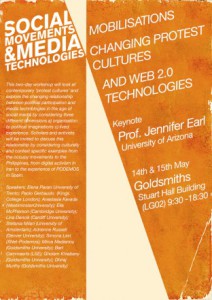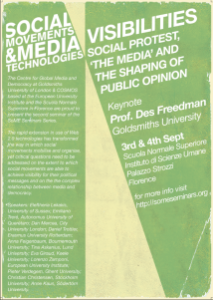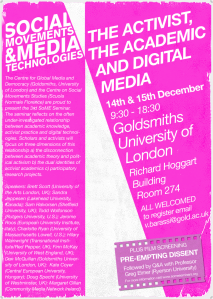The Social Movements and Media Technologies: Present Challenges and Future Developments Seminar Series (SoME Seminars) is funded by the Economic and Social Research Council (ESRC) and jointly organised by the Centre for Global Media and Democracy (CGMD) at Goldsmiths University of London and the Centre on Social Movement Studies (COSMOS), Institute of Humanities and Social Sciences, Scuola Normale Superiore, Florence.

The aim of the series is to tackle and critically understand one of the crucial societal changes of our times: the relationship between political participation and media technologies. With the development of web 2.0 technologies, the rapid growth in the use of social networking sites, and the recent wave of unrest that has affected many countries in Europe and across the world, a thorough exploration of how social movements and collective action relate to media forms and processes is more necessary than ever. In the last decade, however, social research has been profoundly affected by techno-deterministic, positivist and ethnocentric analyses. In contrast to these approaches, the series is based on the belief that it is vital to create a space for discussion among international academics, activists, and policy makers, which can enable us to develop a more critical and culturally sensitive approach in the understanding of social movements and media technologies.

The seminar series consist of six two-day workshops, which take place between May, 2015 and December, 2016. The first seminar of our series Mobilisations: Changing Protest Cultures and Web 2.0 Technologies explored how Web 2.0 technologies are re-shaping protest cultures as well as movements’ organisations and networking dynamics. In the second seminar we turned our attention to the complex relationship between social conflict, mainstream media and the issue of visibility. Our second seminar Visibilities: Social Protest, ‘The Media’, and the Shaping of Public Opinion engaged with critical questions about the extent to which social movements are able to achieve visibility for their political messages and on the continuing role mainstream media play in the shaping of public opinion. In the third seminar, titled The Activist, the Academic and Digital Media: Challenging Research, Re-thinking Theory, we took a step back and reflected on the often under-investigated relationship between academic knowledge, activist practice and digital technologies.

Within all three seminars the research presented was of the highest quality, the discussions engaging and the level of interdisciplinary exchange was thought-provoking. During this first year of the series, we are delighted to have brought so many scholars together and have developed different lines of inquiry that can inform future research. Here below we would like to briefly share some of the key discussions and findings with the Re.Framing Activism collective and readers.
- RESEARCH BEYOND AND WITHIN TECHNOLOGICAL STRUCTURES : One of the key aims of the series was to deconstruct the wide spread techno-determinism that defines much of current research. Yet questions about technological structures, political economy and digital surveillance were at the heart of many of the papers discussed, especially during the first and second seminar. The SoME seminars have thus highlighted that although current research in the field needs to understand the importance of moving beyond techno-deterministic approaches when studying political participation and media technologies, scholars need also to take into account the impact of technological structures and consider issues such as censorship, digital noise, visibility struggles, technological affordances and algorithmic logics. When we study the use of communication technologies for political purposes we need to understand that technological structures matter because they create the means through which participation can be enacted. Therefore, for the future, we were left with the challenge of finding ways of tackling this tension and developing approaches that enable us to appreciate the impact of technological structures whilst understanding how people actively negotiate with them.
- DIGITAL ACTIVISM AND THE VISIBLE INDIVIDUAL: Many of the papers and discussions that took place during the SoME seminars evolved around the question about the dynamic between the individual and collective. Whilst this is not a new issue for social research and especially in the study of social movements, it is becoming clear that critical questions need to be raised on the relationship between the visible activist and the broader social movement. Scholars and activists highlighted the fact that one of the most crucial tensions, which defines social movements’ engagement with digital technologies is represented by the explosion of individually centred communication processes via social media. This tension often affects two different yet intrinsically connected political processes. On the one had we have the problem of building politically significant social movements. In fact, ‘individual participation’ to big protest events, does not necessarily translate into the construction of meaningful political projects, collective identities or social alternatives. On the other hand, scholars reached the conclusion that critical questions need to be raised on the relationship between the visible activist and the broader social movement. In particular we realised that we need to deconstruct the idea that individually centred grassroots forms of organising that are fostered through digital activism are the equivalent of a social movement.
- MEDIA ECOLOGIES AND COMMUNICATIVE HIERARCHIES Many of the papers presented during the SoME Seminars reached the conclusion that the rapid extension of web 2.0 technologies among political activists is triggering new challenges in terms of the communication hierarchies that they need to confront themselves with. These implies that they not only have to come to terms with the new media ecologies that define the mainstream media landscape, but they also need to take into account new constrains that impede the online flow of alternative political messages. These include issues such as information overload and digital noise, cultures of immediacy and time regimes, digital censorship and new communicative elites. Considering the many different communicative hierarchies that are emerging in the current information ecologies, scholars realised that much social movement research is at present lacking data on their social complexities, and on how these communicative hierarchies are re-shaping activists understanding of their mediated practices. In addition to this a particular emphasis, especially during the second seminar, has been placed on the importance of the movement for media reform, a type of reform that target both media institutions and digital corporations, and that is based on a radical project and mission.
- DEMOCRATISING RESEARCH AND THE ACTIVIST/ACADEMIC: One of the critical questions that we have explored throughout the SoME seminars is the relationship between ‘politics of knowledge’ and ‘political engagement’. At different times throughout the year we discussed the importance of creating participatory research projects that address the needs of social movements rather than simply describe their activities and their interactions with the media. Participatory action research has thus been at the very heart of our discussions and future planning. At the same time during these discussions we have also become increasingly more aware of the fact that – as politically engaged scholars – we need to critically reflect on the systems within which academic research is produced and transmitted. Despite the move to open access or other important steps in making academic research more accessible, we came to the conclusion that many actions need to be taken to ensure that our research is more democratic and available to activist networks. This implies not only that we need to re-think our research design but also that we need to consider redefining our research ethics as well as creating new spaces ‘in-between’ for the growth of new alternatives for social research.
- THE SOCIAL COMPLEXITY OF PROTEST CULTURES: Another fundamental theme addressed by the SoME seminars series is the urgent need to tackle existing understandings of ‘changing protest cultures’, by considering the complex dialectics between the historical dimensions of social movements and their cultural varieties. In the first three seminars of the series we have tried to tackle this need by bringing into conversation different papers with cultural and context specific approaches. We have also engaged in thorough and thought-provoking discussions on communication technologies, social movements and historical memory. Nevertheless, a lot of work needs to be done in defining the way in which we study, understand, and analyse the role of political cultures in movement/media interaction. This will be our aim for the next upcoming seminar The Missing Actor: The Meaning of Political Cultures in Movement/Media Interactions, which will take place in Florence in April, 2016. This seminar questions the role of ‘political cultures’ when studying interactions between media and movements, which we provocatively identified as the ‘missing actor’. Current research on social movements and media technologies has been profoundly affected by techno-deterministic, positivist and ethnocentric analyses. This is to detriment of a thorough understanding of the complex relationship between political cultures, imagination and media/movements interactions. The aim of this seminar is to shed light on this complexity through three different panels a) political imaginations in media/movements interactions b) extreme-right political cultures and media/movement interactions c) left-wing political cultures and media/movement interactions. Scholars and activists will be invited to explore culturally and context specific examples, and to create a space in which we can re-think the role of the political in contemporary research on activism when it comes to interactions between different types of media technologies and social movements.
We are looking forward to the next three seminars of the series, which will take place this year. We would like to thank you all of those who have contributed and participated to our series thus far, and we welcome any comment and expression of interest through our blog someseminars.org.
Veronica Barassi (Goldsmiths, University of London) and Alice Mattoni (Scuola Normale Superiore, Florence).

One Comment Add yours